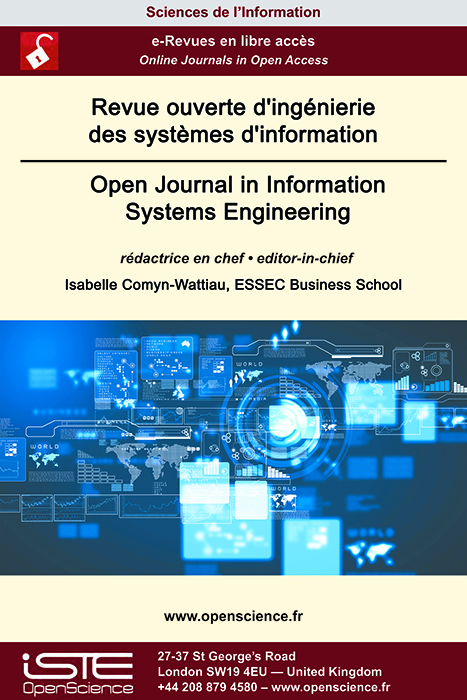

Information and Communication > Home > Open Journal in Information Systems Engineering > Issue
Ce numéro spécial de la revue Open ISI regroupe des extensions d’articles sélectionnés d’INFORSID 2021.
Detection and characterization of polarization are of major interest in Social Network Analysis, especially to identify conflictual topics that animate the interactions between users. As gatekeepers of their community, users in the boundaries significantly contribute to its polarization. We propose ERIS, a formal graph approach relying on community boundaries and users’ interactions to compute two metrics : the community antagonism and the porosity of boundaries. These values assess the degree of opposition between communities and their aversion to external exposure, allowing an understanding of the overall polarization through the behaviors of the different communities. We also present an implementation based on matrix computations, freely available online. We compare our method with existing solutions. Finally, we apply our proposal on real data harvested from Twitter with a case study about the vaccines and the COVID-19.
In December 2019, an epidemic of pneumonia attributed to a new coronavirus started in the Chinese city of Wuhan. Its global spread led the WHO to declare the COVID-19 epidemic a pandemic on March 11, 2020. Europe has also been hit by the epidemic and has experienced successive confinements to limit the pressure on health care systems. However, some countries (e.g. Taiwan and South Korea) have been better able to contain the pandemic, as evidenced by significantly lower mortality figures. In these countries, digital technology is often an important part of the government’s response to the pandemic. In this research, we focus on the adoption of mobile contact tracing applications, which are widely deployed in Europe on the model of comparable Asian projects. On the one hand, we highlight the disconnection between the state of knowledge, formal or experiential, of proximity tracing applications. On the other hand, thanks to the analysis of the decision making process in front of this innovation, for governments and citizens, we identify two distinct modalities of consent, free or directed. We prefer a local diffusion strategy to global diffusion strategies and propose an application to the university context.
Detection of real-world events using online data sources is a trending topic in the information retrieval domain. Multiple data sources are potentially of interest and some of them are data streams. There are multiple data sources that are potentially interesting, and some of them are textual data streams, structured or unstructured. We propose to analyse the problem of event detection from text data stream and to focus particularly on the importance of the representation of the textual data. To do so, we compare multiple approaches in different contexts: supervised and unsupervised. We focus on the performances of Transformer-based architectures for event detection on short text documents, and we conclude that, contrary to previous studies, these architectures can be competitive compared to classical methods.
The General Data Protection Regulation (GDPR) dramatically affects the way organizations approach data privacy, forcing them to rethink and upgrade their business processes in order to comply with GDPR. Through this systematic literature review (SLR) we examine the primary studies, identify the research carried out and the methods that are proposed, applied and integrated into a business process life cycle (as defined by BPM) to cope with this new regulation.
Designing sustainable systems involves complex interactions between environmental resources, social impacts, and economic issues. In a constrained world, the challenge is to achieve a balanced design across those dimensions while avoiding several barriers to adoption. This paper explores the concept of fairness in sociotechnical system design, including its information system component. It is based on a reference sustainability meta-model capturing the concepts of value, assumption, regulation, metric and task. Starting from a set of published cases, different fairness patterns were identified and structured in a library enabling the application of strategies for adoption, anticipation, distributive justice, and transparency. They were generalised and documented using an existing sustainability template. An extension to the initial meta-model is also proposed to identify and reason on assumptions and barriers to reach the desired values. Finally, the validation of our work is discussed using two case studies, respectively addressing the fairness to manage the COVID-19 crisis and the medico-social follow-up of childhood.
This article presents a selection of four of the seven short articles from the Forum of junior researchers (JCJC) of INFORSID 2020. Snapshot of the French research landscape by doctoral students in information systems, this article considers the topics of the detection of weak signals in social networks, temporal graphs, digital traces in the field of tourism and populating knowledge bases.

2026
Volume 26- 6
Special Issue2025
Volume 25- 5
Issue 12024
Volume 24- 4
Special Issue2023
Volume 23- 3
Special issue2021
Volume 21- 2
Issue 12020
Volume 20- 1
Issue 1